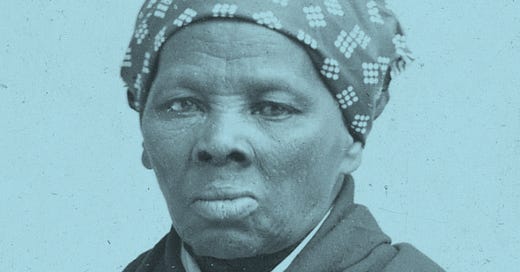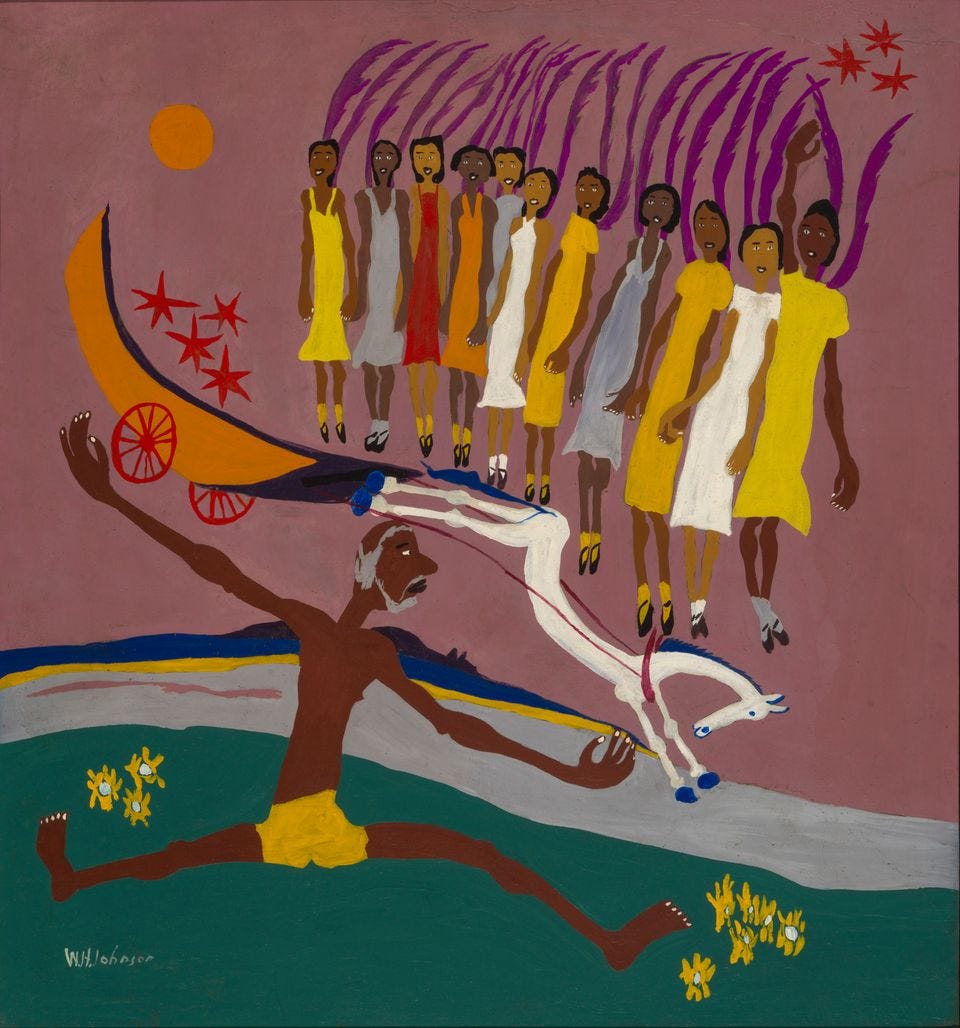🙏🏼 Would you mind doing me a big favor and helping me spread the word about The Spiritual Almanac? Thank you!
Mar 10: Harriet Tubman Day
Every great dream begins with a dreamer. Always remember, you have within you the strength, the patience, and the passion to reach for the stars to change the world. —Harriet Tubman
The night was still as Harriet Tubman gathered a small group of escapees along the banks of the Choptank River. She spoke in hushed tones as they prepared to cross the dark waters before them.
Then, softly but clearly, her powerful voice rang out in song: “Wade in the water, Wade in the water, children...”
Signals hidden within these lyrics urged her fugitives onward through the river on their northward road to freedom.
It was one of many times the American abolitionist and social activist called upon her faith and the secrecy embedded within the spiritual songs that sustained generations of her ancestors in bondage.
Clever Codes Sung in Front of Their Oppressors
As an enslaved person in Maryland before escaping to freedom in 1849, Tubman would have been familiar with spirituals and the hidden meanings within the lyrics.
Certain words and phrases conveyed coded messages of escape, resistance, and hope without raising the suspicions of enslavers.
Here are some songs they sang right under the noses of their oppressors that led them home.
🎵 Swing Low, Sweet Chariot 🎵
“Swing low, sweet chariot, Coming for to carry me home. I looked over Jordan, and what did I see, Coming for to carry me home. —Wallace Willis
Of all the times I sang Swing Low, Sweet Chariot in Girl Scouts and church, I was unaware of its history as a song used on the Underground Railroad. I always thought it was about Elijah being taken by a chariot to heaven.
When Wallace Willis, an enslaved person from Oklahoma, wrote the lyrics, his inspiration was the land beyond the Ohio River.
The "swing low" reference may have instructed runaways to hide low to avoid detection. It reminded them to stay out of sight and lay as flat to the ground as possible while in transit.
The verse "I looked over Jordan and what did I see" refers to Ripley, Ohio.
Ripley served as a significant station on the Underground Railroad. The town was home to many abolitionists, including John Rankin, who helped countless enslaved people escape to freedom in the North.
Getting to the town was challenging because of its elevated location atop a hill. It also served as a rendezvous point for freedom seekers who waited for their helpers to arrive before continuing.
They saw the Ohio River as the Bible's symbolic representation of the River Jordan. The clandestine "chariot" was Harriet Tubman and her "band of angels" who transported people to freedom.
But over time, the song lost its original meaning as it spread and became popularized by white performers. It became a comforting hymn about death and salvation rather than a call for liberation.
🎵 Follow the Drinking Gourd 🎵
“When the sun comes back and the first quail calls, Follow the Drinking Gourd. For the old man is waiting for to carry you to freedom, If you follow the Drinking Gourd.”
—Unknown
Follow the Drinking Gourd is another coded song used during slavery to communicate secret messages and directions to freedom. The “drinking gourd” refers to the Big Dipper constellation, which enslaved people would use as a guide to travel north.
The old man symbolizes Harriet Tubman, the “Moses of her people,” who made thirteen missions to rescue approximately seventy enslaved people, including her family and friends.
"I was conductor of the Underground Railroad for eight years,
and I can say what most conductors can't say – I never ran my train
off the track, and I never lost a passenger."
The first quail call represented the start of spring and the ideal time for enslaved people to escape without leaving behind any tracks in the snow.
The lyrics also indicate that one should follow the drinking gourd when the sun returns, emphasizing the importance of following it at night when the stars are more visible. This was a critical detail, as traveling at night provided cover and reduced the risk of being caught.
The last verse emphasizes that reaching a safe place, referred to as "the Promised Land," symbolizes the chance for individuals to live without bondage in Canada or other Northern states that had abolished slavery.
🎵 Wade in the Water 🎵
“Wade in the water, Wade in the water, children, Wade in the water, God's a-going to trouble the water.” —Unknown
Wade in the Water carries deep symbolism and hidden messages. On the surface, it refers to the physical act of moving through water, a literal necessity for survival and a symbolic representation of seeking freedom.
Enslaved individuals often had to cross rivers or bodies of water as they escaped from plantations, making water a powerful symbol of both life and death.
Beyond its literal meaning, the song's lyrics also suggest wading in the water to avoid being tracked by bloodhounds. Enslaved people used this tactic to throw off the scent of their pursuers and increase their chances of freedom.
The song’s lyrics also mention, “God’s gonna trouble the water,” which one could interpret as Tubman intervening divinely on their journey to freedom.
🎵 Steal Away to Jesus 🎵
“Steal away, steal away, steal away to Jesus! Steal away, steal away home, I ain't got long to stay here.” —Wallace Willis
The haunting melody of Steal Away to Jesus, sung in hushed tones, implies slipping away quietly, unnoticed by oppressors. This phrase held a dual meaning for enslaved individuals: a plea for spiritual salvation and a coded message for escape.
People often used the word "steal" as a euphemism for escape or running away. When sung in this spiritual context, it was a clear call to action: to leave behind the bondage of slavery and find refuge in the North.
“When I found I had crossed that line, I looked at my hands to see if I was the same person. There was such a glory over everything; the sun came like gold through the trees and over the fields, and I felt like I was in Heaven.”
This Week's Inspiration: Listen to Etta James sing Swing, Swing Low, Sweet Chariot
Besides their hidden messages and practical use in the Underground Railroad, spirituals have made an indelible mark on American music and culture. They embody the spirit of a people who, despite unimaginable adversity, never stopped dreaming of liberty and justice.
As we reflect on these songs today, we are reminded of the enduring strength of the human spirit and the power of music to inspire change.
Listen to Etta James sing Swing Low, Sweet Chariot (2:52 mins), and feel your heart left with her voice.
Do you have a favorite spiritual? Please share in the comments!
Clicking the 💚 heart button goes straight to my heart and helps others find this essay!
Want to read more about Harriet Tubman? Here are some publications you may enjoy.
Harriet Unveiled: The Powerful Legacy of America's Iconic Freedom Fighter by
New Book and New Take on Harriet Tubman by
“My people are free!”











Fascinating history, Mary. Thank you! I remember a visit to the Underground Railroad Museum in Cincinnati and reading about "Follow the Drinking Gourd" and its association with the Big Dipper pointing the way to the North Star. I love "Swing Low, Sweet Chariot," and I once sung it--over and over--to comfort a woman with severe Alzheimer's at a guest ranch where I worked. I found her wandering by herself along a steep cliff; she was so agitated she wouldn't follow me back to safety until I began singing "Swing Low." After a few verses, she let me lead her away from the edge and into a nearby building where I kept singing to her until I found someone who could fetch her family. I must have been channeling some of the song's history that day.
Fascinating , I love “Swing Low” and used to sing it to my Granddaughter. Good to know its history and meaning , as well as listen to such a beautiful rendition. Thank You 🙏🏻